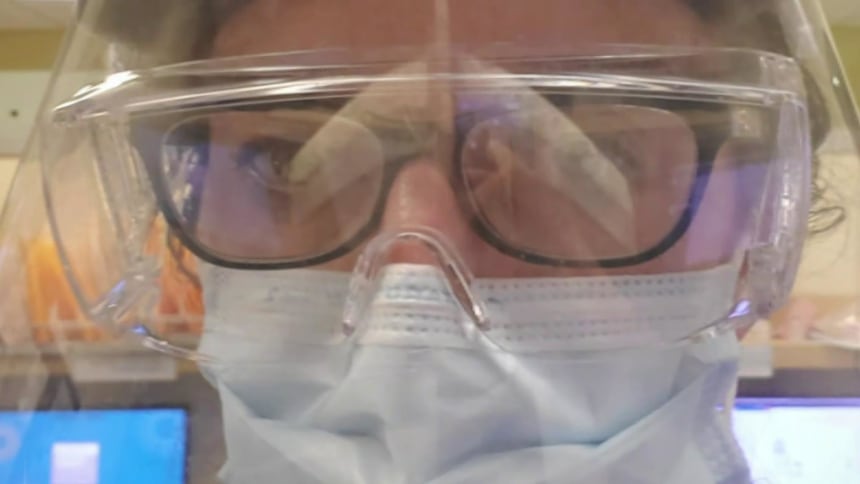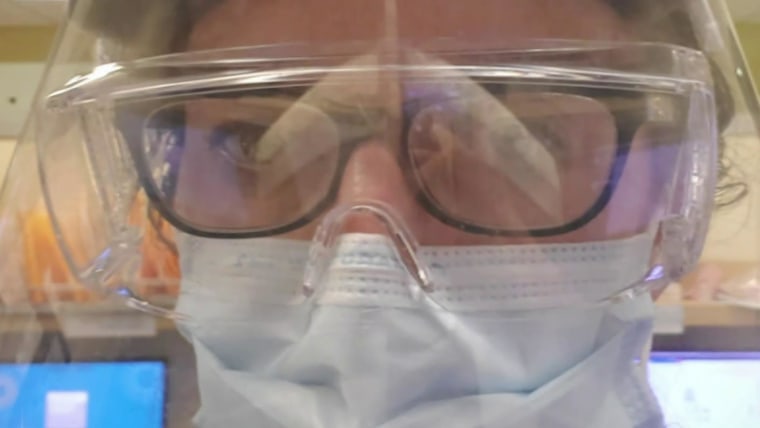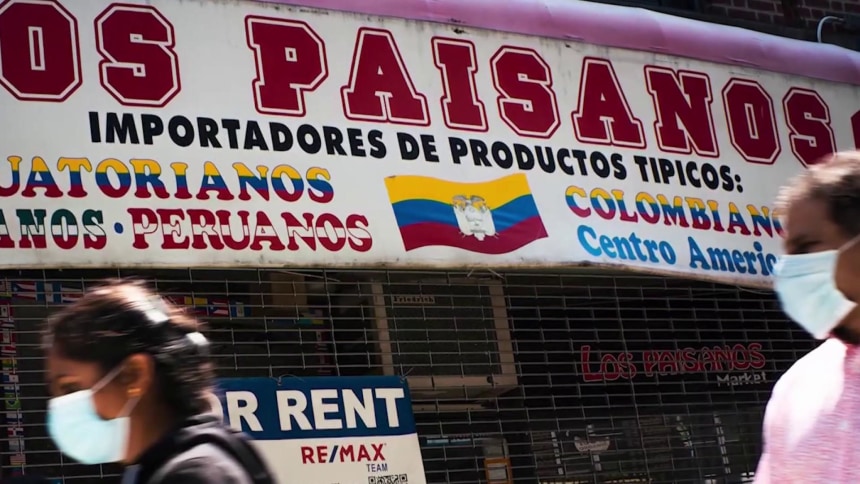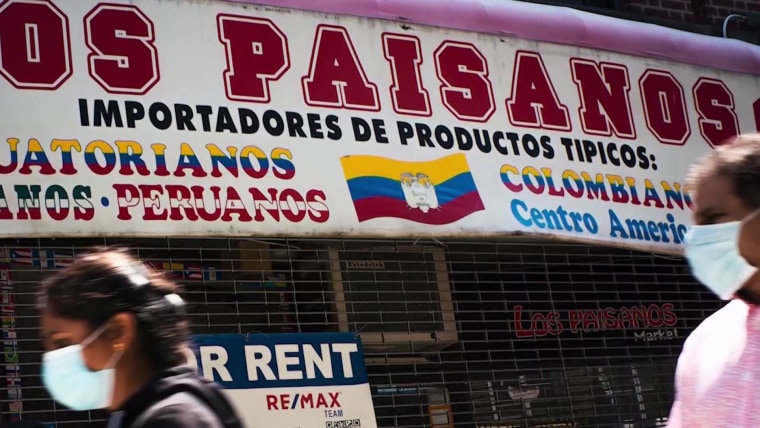
Hope Gilmore, a call center worker on Staten Island, New York, hasn't forgotten those bewildering early weeks of the coronavirus pandemic when colleagues were getting sick, her employer didn't provide any masks or gloves and people used the elevator one at a time to socially distance.
"We're on the frontlines like sacrificial lambs," Gilmore said Thursday.
But after being permitted to work from home after six people in her office contracted COVID-19, certain workers are now being asked to return, Gilmore said, a worrying request that coincides with New York City tentatively rolling out a third reopening phase this week, including businesses like nail salons and retail stores.
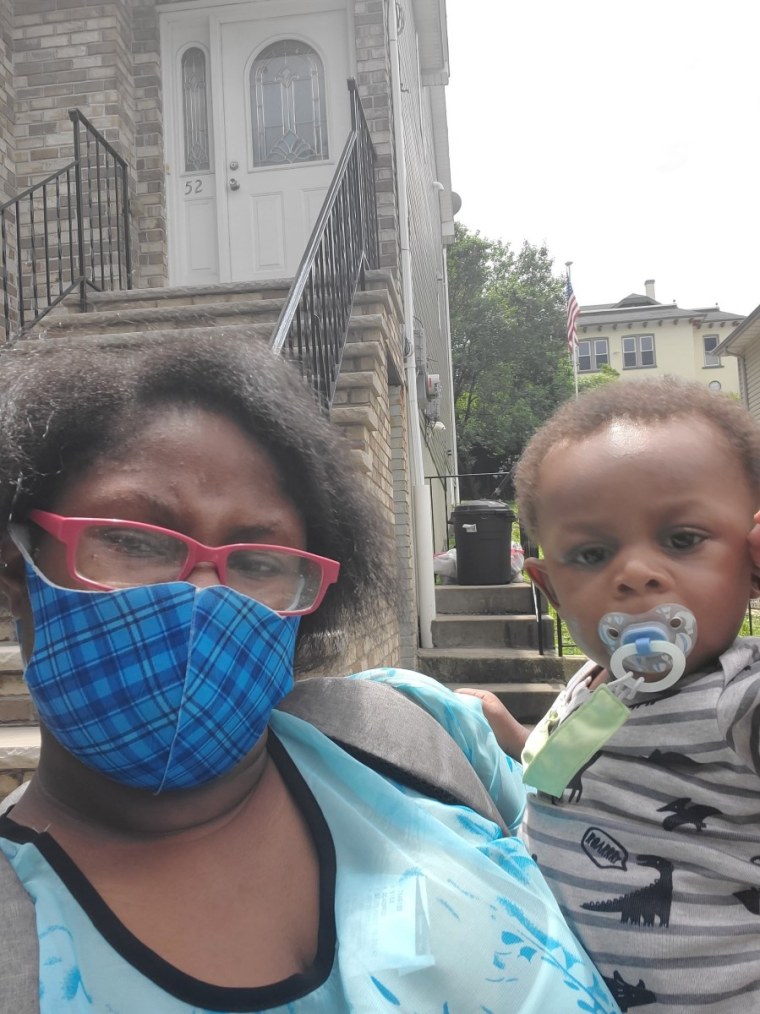
With people going back to work amid record coronavirus cases in cities and states across the country, workers such as Gilmore who were deemed "essential" at the beginning of the pandemic are again demanding protections and want state and local officials to put regulations in place that would sufficiently require employers comply or face penalties.
"We can't leave it up to each individual employer to do it — they're not going to," said Gilmore, who credits her union, the Communications Workers of America Local 1102, with pushing to get her workspace professionally cleaned.
Labor rights groups and worker advocates have supported proposals for an essential workers' "bill of rights," variations of which have been floated over the past few months, including on the federal level by Democrats Sen. Elizabeth Warren of Massachusetts and Rep. Ro Khanna of California. Employees, including grocery store workers, nurses, doctors, and those in foodservice, would be granted health and safety protections, higher compensation, child care support, and guaranteed sick pay.
Various cities have been pushing for similar worker safeguards. In Philadelphia, a whistle-blower bill proposed last month would make it illegal for employers to retaliate when workers claiming unsafe conditions because of the coronavirus don't come to work and make their grievances public.
Earlier in the pandemic, San Francisco passed workers' rights legislation that required employers to provide personal protective equipment (PPE), abide a no retaliation clause, and adhere to other standards.
Health care workers facing shortage of lifesaving PPE
JULY 10, 202001:53
In New York City in May, the City Council held hearings on a package of bills that included protections for essential workers, including for nonsalaried employees at large companies and paid sick leave for gig workers. The bill remains held up in the committee.
Some workers' rights advocates want Gov. Andrew Cuomo, a Democrat, to issue an executive order supporting guidelines they dub the New York Health & Essential Rights Order, or NY HERO, which would create "enforceable standards and protocols that must be followed by businesses to protect all workers."
That includes ensuring PPE, disinfection and deep cleaning of workplaces, and a prohibition on retaliation.
The need for a government-backed order or legislation in the thick of the pandemic is necessary, given the impact the coronavirus has already had on places like meatpacking plants and farms, where low-wage, immigrant and Black and brown workers are most at risk of falling ill, said Daisy Chung, the deputy director of ALIGN, an alliance of labor and community organizations in New York.
"The virus hasn't disappeared. This is going to be with us for a while, and the fear and anxiety hasn't gone away," Chung said. "For us, it's never too late to implement something."
Rosanna Rodriguez, co-executive director of the Laundry Workers Center, which advocates on behalf of low-wage immigrants in the industry, said she's heard several accounts of workers who fell sick at the beginning of the pandemic or had ill colleagues, refused to go to work and were subsequently fired. She wants a safety net so that it can't happen again.
"I know some laundromats are taking some measures, but in general, there are no clear guidelines," Rodriguez said. She added that while the Occupational Safety and Health Administration, or OSHA, released federal guidance on returning to work, employers who might already be skirting employment and wage laws can't be trusted to follow them unless city and state agencies create laws or orders that sufficiently hold them accountable.
"We know the majority of these essential workers are people of color in New York City, and it's unfair in a city that was built by immigrants that there's no job protection, health, and safety during a pandemic where they're risking their health," Rodriguez said.
Business groups argue that employers are also being burdened by a pandemic that has eroded profits and forced even major companies and retailers to go bankrupt.
"Nearly every small business has been negatively impacted by COVID-19 and the resulting economic shutdowns," Greg Biryla, the New York state director of the National Federation of Independent Business, said in a statement. "Even businesses back operating or deemed 'essential' have dealt with capacity restrictions and depressed consumer demand," he said, adding that New York state has done a "commendable job" developing industry-specific safety requirements.
The last thing reputable employers want is for workers to get sick precisely because they're the backbones of their businesses, said Frank Kerbein, director of the Center for Human Resources at The Business Council of New York State, which represents about 2,400 companies, chambers of commerce, and professional and trade associations.
‘Brink of survival’: Cash-economy workers struggle amid reopening
JULY 3, 202003:40
Kerbein said there may be employers who are flouting safety requirements under OSHA, and "they need to be held accountable for that," but effective federal and state laws and guidance already exist, and those come with fines for violations.
"In general, we oppose an additional mandate on top of this mandate for duplicative reasons," Kerbein said, "and requiring essential employers to bear the cost of a public health emergency doesn't seem equitable. This wasn't their choice."
But Rebecca Kolins Givan, an associate professor at Rutgers University's School of Management and Labor Relations, said reports of coronavirus outbreaks at places of employment only underscore that some businesses aren't adhering to safety standards.
"Employers are tending to take the position that they're complying with OSHA guidelines, but it's extremely clear that OSHA guidelines are not protecting workers and are toothless," Givan said. "The entire reason for having government regulation is that the market will not create safe workplaces."
Doug Washington, a private sanitation worker in Queens, New York, for almost two decades, said it wasn't his choice to contract the coronavirus in late March, leaving him out of work for six weeks.
The job was already hazardous pre-pandemic, Washington, 41, said. While his employer now provides masks and cleaning agents, Washington supports expanded regulations that ensure all employers are looking out for their workers now that more of them are back at work.
In the meantime, the unknowns of the coronavirus still linger and the threat of a second wave in early hot spots like New York is possible, health officials warn.
"What happens if I get sick again?" Washington asked.

